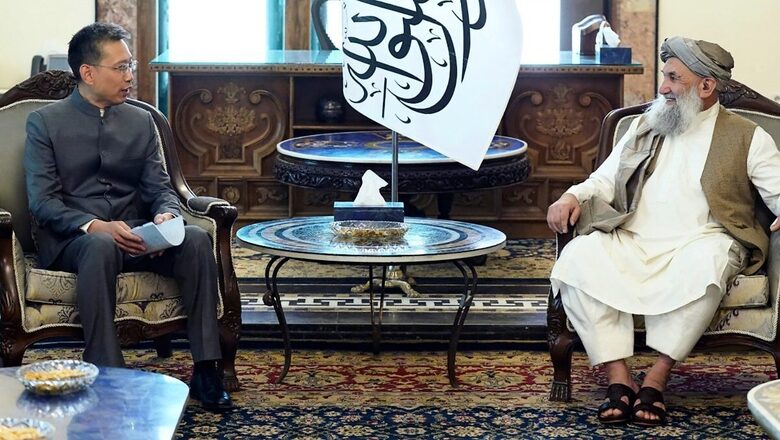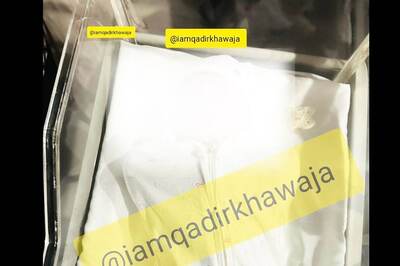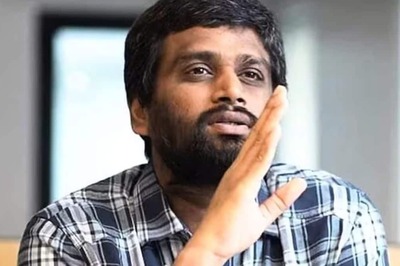
views
China on Wednesday became the first nation to name a new ambassador to Afghanistan since the takeover by the Taliban terror group. The nation appointed Zhao Xing as the ambassador to Kabul becoming the first country in the world to appoint an envoy to Afghanistan under the Taliban 2.0 regime.
Zhao Xing was accorded a warm welcome by the Taliban officials with Mohammad Hassan Akhund, acting prime minister in the Taliban administration, according him a warm welcome. The acting foreign minister, Amir Khan Muttaqi, was also present.
The strengthening of ties between the Taliban and the Communist Party of China (CPC) is based on reciprocity. China is eyeing Afghanistan’s lithium reserves and has allowed private company Gochin to see if those reserves can be exploited following the nod from the Taliban bigwigs.
China needs lithium because it wants to control the element which is required for a vital component of batteries—for phones, laptops and for the electric vehicles which could soon become a new normal when it comes to transportation as global warming impacts all.
China has been dominating the global lithium battery supply chain over the last two decades and an access to Taliban-held Afghanistan’s reserves could mean a control over lithium supply for several decades to come. China, which itself has lithium reserves estimated at 4.5 million tonnes, also has close ties to Chile, Bolivia and Argentina – the top three nations with the largest lithium reserves.
China controls 80% of the world’s raw material refining, 77% of the world’s cell capacity and 60% of the world’s component manufacturing, according to Bloomberg.
The Assessment Capacities Project or ACAPs, an aid research group, said that Chinese state companies and various levels of government have sent aid worth $50 million to China. Taliban official Mullah Abdul Ghani Baradar now wants China to resume the $3 billion investment made in the Mes Aynak copper mines.
Gochin, the company exploring the lithium reserves, will reportedly invest $10 billion and create around 120,000 jobs. Acting mining minister Shahabuddin Delawar claimed that little known Chinese companies along with Iran, Turkey and the UK, invested $6.5 billion in mining contracts.
Afghanistan is also gradually entering the ambit of the China-Pakistan Economic Corridor (CPEC). The Pakistan Railway and state-owned China Railway Eryuan Engineering Group issued construction tenders to build a rail line between Karachi and Mazar-e-Sharif.
India has opposed the CPEC and terms it as an ‘inherently illegal, illegitimate, and unacceptable’ endeavour. New Delhi protested the project from its very beginning since it passes through large parts of the Pakistan-occupied Kashmir (PoK).
“We have seen reports on encouraging proposed participation of third countries in so-called CPEC projects. Any such actions by any party directly infringe on India’s sovereignty and territorial integrity,” Ministry of External Affairs (MEA) spokesperson Arindam Bagchi said last year.
China also wants the Taliban to ensure that members within its ranks lower the rhetoric on the alleged mistreatment and human rights abuses faced by the Uyghurs in Xinjiang.
It wants the Taliban to take action against the East Turkestan Islamic Movement, an umbrella name used by the CPC for Uyghur militants gathered in Afghanistan
However, the China-Taliban ‘love story’ is still in its honeymoon phase. It cannot be guaranteed, as evidenced by the bombing of the Chinese-owned hotel in Kabul last December, that the relationship will go ahead smoothly.
China could also face repercussions on the global stage for siding with a power which has launched a full-scale attack on rights of women and minorities. It already is facing pressure for supporting Russia in the war in Ukraine.
The Taliban emerges as a winner for the time being because even though there is no international recognition, Beijing’s embrace is helping the nation tide over issues related to food security and economic growth.
(with inputs from Nikkei Asia, Wired, OneCharge and Reuters)



















Comments
0 comment